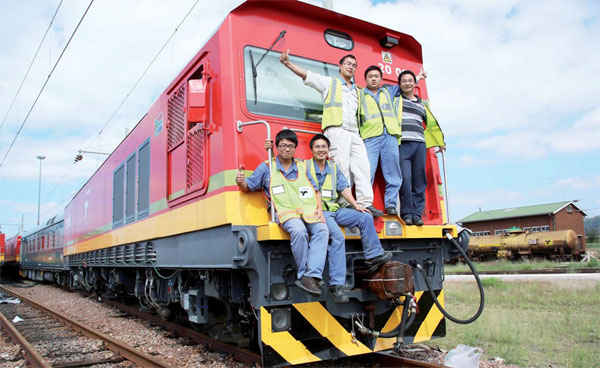South Africa next stop for train builder
|
Employees of CSR E-Loco Supply (Pty) Ltd celebrate the arrival of locomotives in Africa in November. Photos provided to China Daily |
Market for high-tech locomotives made by chinese subsidiary promising in several countries
A Chinese locomotive manufacturer plans to set up a factory in South Africa after landing a series of major train building deals.
She Yongjun, the commercial manager of CSR E-Loco Supply (Pty) Ltd, says the factory should be in place this year or next, and will target state-owned transport companies.
Established in 2012, CSR E-Loco Supply is the South African subsidiary of CSR Zhuzhou Electric Locomotive Co Ltd, part of the giant China South Locomotive and Rolling Stock Corporation Ltd, which is considered the world's largest manufacturer of electric locomotives.
Headquartered in Johannesburg, the business has "huge potential" in South Africa and across the continent, She says.
"The country has the longest railway network in Africa and was the world's leading rail hauler, but it has lost its luster in the past few decades owing to insufficient maintenance.
"By buying Chinese locomotives, with their level of improved technology, South Africa aims to enhance its industrial transport chain."
CSR E-Loco started eyeing the South African market in 2000 and won its first order there in 2012, to provide 95 electric locomotives for Transnet SOC Ltd, a South African rail, port and pipeline company.
The deal was considered the largest overseas Chinese electric locomotive deal at that time, She says.
"The buyer was very satisfied with our quality, our delivery times, our service attitude and our efficiency, and ordered another 100 of the same locomotives."
Later that year Transnet tendered for the supply of a further 1,064 locomotives, 599 electric and 465, to be powered by internal combustion engines.
CSR E-Loco won the contract to supply 359 of its electric locomotives, with the Canadian firm Bombardier supplying the remaining 240.
Some have been for trains manufactured in China, with most delivered in parts to South Africa and assembled locally by the engineering division of Transnet.
More than 100 of its Chinese technicians have moved there to help in the assembly, and it has orders until 2018.
The future looks bright. Chinese Premier Li Keqiang visited Ethiopia, Nigeria, Angola and Kenya in early May to strengthen China's economic ties with the continent, and pledged to continue to invest in African infrastructure, particularly high-speed railways, expressways and regional airports, a priority for China companies.
He also underlined the importance of bringing Chinese infrastructure research and development to Africa, along with the export of other leading technology, particularly from the telecommunications and power industries.
Liang Guoyong, an economic affairs officer at the investment and enterprise division of the United Nations Conference on Trade and Development, says China has "unique technology that can be exported to developing markets and the rest of the world", such as in high-speed rail.
"Combined with its capital advantage, this will optimize the country's overseas investment landscape, which is centered on energy and resources currently," he says.
She Yongjun described the competition for orders in South Africa as "very fierce" because its rivals are mainly well-known global brands.
"Our advantage centers on price, delivery time and quality, which makes us comparable with the best in Europe."
Transnet freight rail, the largest division of Transnet, was impressed by the fact that CSR E-Loco delivered its first locomotive just 12 months after signing the contract in October 2012, about six months shorter than the global delivery average of 18 months, he says.
"We have kept improving and re-innovating our operations and we developed all the core parts of those 359 locomotives ourselves. China's electric locomotive industry is leading edge."
South Africa's railway gauge is narrower, at 1067 mm, than China's standard gauge of 1435 mm.
"It was the first time we have produced electric locomotives for that narrow a line, but we delivered the perfect products to our customer," She says.
The order was mainly for carriages used to transport coal and ore.
"While we appreciate that these large-scale deals may become less frequent in South Africa, we still believe the market remains a strong prospect for us and that further locomotive orders will be offered."
Orders are expected for parts and other railway products, too.
In addition to the South African contracts, the Johannesburg-based company has landed deals in Ethiopia, which also helped it contribute to the parent company's total revenues of 15.1 billion yuan ($2.42 billion) in 2012, and 20 billion yuan last year.
However, She says that further government financial support will be needed if the company hopes to remain competitive.
A shortage of working capital had hindered its bidding in 2012 to supply passenger trains there, he says, calling for tax breaks to be introduced for equipment exports "as European and American rivals continue to lower their prices".
"Continued communication between the governments is vital to help us source local components and reliable local partners."
The company's operations have also been affected by currency fluctuations, frequent strikes and rising labor costs, and those could still dent its factory plans in South Africa, he says.
"But we will set up a plant here to produce key components, as the local government has raised its requirements for local parts on some products," She says.
The company is also committed to corporate social responsibility in the local market, including worker training and technology aid, he says.
From June to November last year, CSR E-Loco trained more than 100 local workers in China on locomotive production, including welding, assembling, quality testing and management skills.
Contact the writers through [email protected]

























